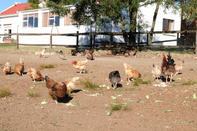Highly pathogenic avian influenza is a notifiable disease, so a suspected outbreak must be reported to a state veterinarian as soon as possible.

Failure to report such a disease is a criminal offence, because of the associated risks. Samples will be taken for laboratory analysis from suspect live and dead birds to confirm the diagnosis and identify the strain of flu. Early identification is extremely important to prevent the disease from spreading to other birds, farms and, if it is a transferrable strain, humans.
Management
A farm where a suspected outbreak has occurred will be placed under quarantine with movement controls to prevent sick birds from getting into contact with susceptible birds.
With no available cure, the majority of countries, including South Africa, try to eradicate the disease through “stamping out.” This entails the culling of all infected and exposed birds, the correct disposal of carcasses and all animal products, thorough decontamination of infested premises as well as strict quarantine and movement controls of poultry and at-risk vehicles to prevent the disease from spreading.
The process is done under government supervision. Special protective clothing and gear are worn during the process, even if the strain is not transmissible to humans. Vaccination is used in some countries to protect healthy birds during highly pathogenic outbreaks or where the disease has become endemic.
The practice is not allowed in South Africa yet, because of the negative impact vaccination might have on international trade and because vaccination might make it more difficult to identify an outbreak.
Some South African role-players, however, feel that vaccination should be allowed if South Africa is unable to compensate producers for losses, as is the practice in most of the first world countries.
Prevention
According to the Department of Agriculture, the virus may easily spread from farm to farm through the movement of domestic live birds, people, especially when shoes and clothing are contaminated, and contaminated vehicles, equipment, feed and cages.
Farmers should, therefore, be extra cautious and vigorous to prevent the disease from getting onto their farms during an outbreak. Producers who keep their birds outside should consider moving the birds to a safer place, as the virus may spread through direct contact with secretions from infected birds – wild or other poultry birds – especially faeces or contaminated feed, water, equipment and clothing.
Other species, such as cats and pigs, may also be carriers of some strains. In many countries, there seems to be a seasonal link, with outbreaks occurring around fall and then dissipating as the climate becomes warmer. South Africa monitors the disease in wild birds and on farms, to take quick steps and alert others of the danger when an outbreak occurs.
By Glenneis Kriel